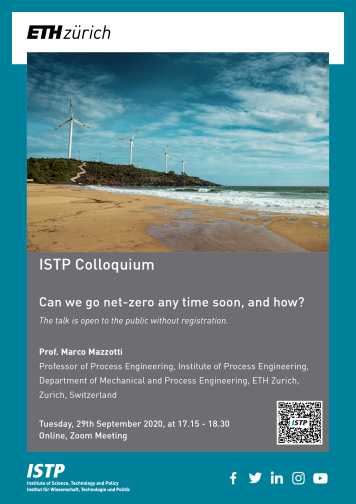Colloquium: Prof. Marco Mazzotti
Tuesday, 29th September 2020, at 17.15 - 18.30
Online, Zoom
https://zoom.us/j/94186703785
Meeting ID: 941 8670 3785
Can we go net-zero any time soon, and how?

Carbon Capture, Utilization and Storage (CCU and CCS) systems play a central role in political debates, technological efforts and scientific developments around climate change, because of two factors. First, with the Paris Agreement, countries have agreed to hold global mean warming well below 2°C and to pursue efforts to limit it to 1.5°C. Second, scientists have shown that any limit to global mean warming implies a maximum cumulative amount of greenhouse gas (GHG) emissions, the so-called carbon budget. Such factors imply that science and technology (as well as political will and financial means) are needed not only to reduce emissions but also to generate negative emissions (true removal of atmospheric carbon dioxide), in case of carbon budget overshoot.
In this talk, several aspects related to the deployment of CCU and CCS systems will be discussed, namely (i) technology readiness levels in different sectors, (ii) trade-offs between use of carbon, use of heat and power and use of land for the different technology chains, (iii) costs associated to them, and (iv) carbon taxes and credits related to them.
About Prof. Marco Mazzotti
Marco Mazzotti, an Italian and Swiss citizen born in 1960, married, with two children, has been professor of process engineering at ETH Zurich since May 1997 (associate until March 2001 and Full Professor thereafter). He holds a Laurea (MSc, 1984) and a Ph.D. (1993), both in Chemical Engineering and from the Politecnico di Milano, Italy. Before joining ETH Zurich, he had worked five years in industry (1985-1990), and had been Assistant Professor at the Politecnico di Milano (1994–1997).
He was coordinating lead author of the IPCC Special Report on CCS (2002-2005), President of the International Adsorption Society (2010–2013), and chairman of the Board of the Energy Science Center of the ETH Zurich (2011-2017). He is Chairman of the Working Party on Crystallization of the EFCE (since 1.07.2014) and one of the six Executive Editors of Chemical Engineering Science (since 1.1.2012). He was a contributor to the Nobel Peace Prize for 2007 awarded to the Intergovernmental Panel on Climate Change (IPCC). He was the recipient of an honorary doctorate from the Otto von Guericke University Magdeburg, Germany (2014). He has been awarded a European Research Council Advanced Grant towards „Studying secondary nucleation for the intensification of continuous crystallization“ (2018-2023).
- You can read a summary of the colloquium talk on our Reports webpage.
- You can download the presentation of the talk Download here (PDF, 27.4 MB).